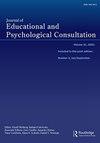幼儿课堂咨询性辅导模式的探索性分析
IF 1.1
4区 心理学
Q4 PSYCHOLOGY, EDUCATIONAL
Journal of Educational and Psychological Consultation
Pub Date : 2022-01-20
DOI:10.1080/10474412.2021.1984930
引用次数: 1
摘要
摘要本研究评估了一种咨询辅导模式,旨在改善幼儿课堂上积极的学习环境实践以及教师的教学风格和影响。15间EC教室的教师作为顾问参加了会议。咨询教练接受了培训,包括学习(a)基于积极和预防性课堂策略中循证实践的具体内容,(b)指导实践,以及(c)实施过程。针对基于研究的一级积极支持环境和教学社会情感学习策略的咨询辅导持续了8周,包括基线和持续观察、反馈以及与EC教师的联合规划。使用多种衡量标准的观察考察了辅导的影响。咨询前后的数据表明,这种模式有可能(a)提高积极的预防性课堂质量,(b)促进教师教学的积极变化。讨论了有效性试验的意义和未来方向,以确认关于咨询辅导实践在EC课堂中的作用的因果假设。本文章由计算机程序翻译,如有差异,请以英文原文为准。
Exploratory Analysis of a Consultative Coaching Model Applied in Early Childhood Classrooms
ABSTRACT This study evaluates a consultation coaching model aimed to improve positive-learning environment practices and teachers’ instructional style and affect in early childhood (EC) classrooms. Teachers in 15 EC classrooms participated as consultees. The consultative coaches received training that included learning (a) specific content based on evidence-based practices in positive and preventative classroom strategies, (b) coaching practices, and (c) implementation processes. Consultative coaching targeting research-based Tier I positive support environments and instructional social-emotional learning strategies occurred over an 8-week period, and included baseline and ongoing observations, feedback, and joint planning with the EC teachers. Observations using multiple measures examined the influence of coaching. Pre- to post-consultation data suggest this model holds potential for (a) increasing positive, preventative classroom qualities and (b) fostering positive change in teachers’ instruction. Implications and future directions for an efficacy trial to confirm causal hypotheses regarding the role of consultative coaching practices in EC classrooms are addressed.
求助全文
通过发布文献求助,成功后即可免费获取论文全文。
去求助
来源期刊

Journal of Educational and Psychological Consultation
PSYCHOLOGY, EDUCATIONAL-
CiteScore
3.40
自引率
23.50%
发文量
20
期刊介绍:
The Journal of Educational & Psychological Consultation (JEPC) provides a forum for improving the scientific understanding of consultation and for describing practical strategies to increase the effectiveness and efficiency of consultation services. Consultation is broadly defined as a process that facilitates problem solving for individuals, groups, and organizations. JEPC publishes articles and special thematic issues that describe formal research, evaluate practice, examine the program implementation process, review relevant literature, investigate systems change, discuss salient issues, and carefully document the translation of theory into practice.
 求助内容:
求助内容: 应助结果提醒方式:
应助结果提醒方式:


